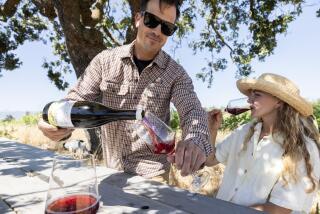Marguleas’ Agricultural Empire Appears in Trouble : Profile: A rating service suspends its approval of Sun World after three top executives leave the company, a major California fruit grower.
- Share via
Howard P. Marguleas, the man who is hoping to sell his shares in the Irvine Co. for $94 million, had been busily building an agricultural empire with aspirations to rival Sunkist or Del Monte.
In the past two years, his Bakersfield-based Sun World has broadened its reach outside of California, with growers in 10 states, Mexico and Chile, and annual sales of about $300 million.
But Marguleas’ empire appears to be troubled. Three key executives have quit since 1992--the president, a co-founder and, in March, Marguleas himself. He left his post as chairman but remains a major owner of the privately held company.
“Some people wonder whether Sun World bit off a bit too much,” said Mike Glynn, editor of The Packer, an agricultural industry newspaper in Kansas City, Mo.
A rating service for agricultural companies, the Red Book, suspended Sun World’s approval rating recently, pending an investigation. A spokeswoman for the Red Book, which is a sister company of The Packer, said the service is checking Sun World’s references and bill payments after so many leadership changes at the company.
Carl San Maggio, a founder, resigned daily involvement with Sun World in December, 1992, though he continues with the company as a partner. Robert Igleheart left the president’s post at Sun World in May of last year.
Marguleas, a resident of Rancho Mirage, has formed 19 companies in his 58 years. Two of these are nonprofit, philanthropic trusts. He currently serves as president of 11 companies, mostly agricultural interests.
Marguleas has served as chairman of the board of the California Chamber of Commerce and has been active in Republican circles.
In January, 1989, he organized a series of parties in Washington surrounding the swearing-in of Pete Wilson by President Bush for Wilson’s second six-year term in the Senate. In 1992, Marguleas served as honorary chairman of the reelection campaign for Assemblywoman Tricia Hunter (R-Bonita).
He owns about $3.4 million worth of agricultural, residential and desert land in Riverside, Alameda and Placer counties, according to land records.
In March, Marguleas sold land in Riverside County to Anthony Vineyards Inc. for $614,500, according to county records.
Marguleas is a prominent name in agriculture. Sun World, under his leadership, purchased a rival, Superior Farms, in 1989, making Sun World the top grower of table grapes in California. With the purchase, Sun World acquired a huge research development facility and a once-patented table grape variety.
Seeking to increase Sun World’s market share, he commissioned Israeli researchers to develop giant red sweet peppers, winter strawberries and tomatoes with a long shelf life.
Currently, he has plant scientists at Israel’s Volcani Agricultural Research Institute, southeast of Tel Aviv, developing a desert mango--one that can be grown in California instead of imported.
With the development, Sun World could capture the American mango market.
“It’s a race to the market, and getting there first means a lot,” Marguleas told a Times reporter last spring.
To heighten its image, Sun World places brand stickers on its patented red bell peppers, seedless watermelons and peaches. The company purchased the patent on the so-called seedless watermelon--which actually contains tiny, white edible seeds--and has made the fruit a household commodity in the past seven years through intensive marketing.
In addition to his agricultural interests, Marguleas serves as president of the nonprofit Heart Institute of the Desert Foundation in Rancho Mirage, and as president of LSL Biotechnologies Inc. in San Diego.
Marguleas supported Donald Bren’s 1982 bid to become chairman of the Irvine Co.’s board because the land development company’s image was in trouble. Marguleas told a judge that he liked the idea of a local person who would play a larger role in company affairs, as opposed to Detroit shopping center magnate A. Alfred Taubman, who preceded Bren as chairman.
Max Fisher, a Detroit-based oilman, invited Marguleas to join the investor group that bought the company from the Irvine Foundation in 1977.
Fisher advised Marguleas to sell his shares to Bren in the winter of 1983, Marguleas said during testimony in a court hearing on the value of the company prompted by a lawsuit by Joan Irvine Smith. Instead, Marguleas chose to retain an ownership position in the company.
More to Read
Inside the business of entertainment
The Wide Shot brings you news, analysis and insights on everything from streaming wars to production — and what it all means for the future.
You may occasionally receive promotional content from the Los Angeles Times.










